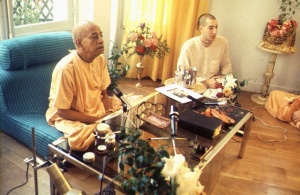CC Adi 13.106 (1975): Difference between revisions
(Vanibot #0027: CCMirror - Mirror CC's 1996 edition to form a basis for 1975) |
(Vanibot #0020: VersionCompareLinker - added a link to the Version Compare feature) |
||
| Line 2: | Line 2: | ||
<div style="float:left">'''[[Sri Caitanya-caritamrta (1975)|Śrī Caitanya-caritāmṛta (1975)]] - [[CC Adi (1975)|Ādi-līlā]] - [[CC Adi 13 (1975)|Chapter 13: The Advent of Lord Śrī Caitanya Mahāprabhu]]'''</div> | <div style="float:left">'''[[Sri Caitanya-caritamrta (1975)|Śrī Caitanya-caritāmṛta (1975)]] - [[CC Adi (1975)|Ādi-līlā]] - [[CC Adi 13 (1975)|Chapter 13: The Advent of Lord Śrī Caitanya Mahāprabhu]]'''</div> | ||
<div style="float:right">[[File:Go-previous.png|link=CC Adi 13.105 (1975)|Ādi-līlā 13.105]] '''[[CC Adi 13.105 (1975)|Ādi-līlā 13.105]] - [[CC Adi 13.107 (1975)|Ādi-līlā 13.107]]''' [[File:Go-next.png|link=CC Adi 13.107 (1975)|Ādi-līlā 13.107]]</div> | <div style="float:right">[[File:Go-previous.png|link=CC Adi 13.105 (1975)|Ādi-līlā 13.105]] '''[[CC Adi 13.105 (1975)|Ādi-līlā 13.105]] - [[CC Adi 13.107 (1975)|Ādi-līlā 13.107]]''' [[File:Go-next.png|link=CC Adi 13.107 (1975)|Ādi-līlā 13.107]]</div> | ||
{{CompareVersions|CC|Adi 13.106|CC 1975|CC 1996}} | |||
{{RandomImage}} | {{RandomImage}} | ||
==== TEXT 106 ==== | ==== TEXT 106 ==== | ||
| Line 13: | Line 12: | ||
:stuti-nṛtya kare vādya-gīta | :stuti-nṛtya kare vādya-gīta | ||
:nartaka, vādaka, bhāṭa, navadvīpe yāra nāṭa, | :nartaka, vādaka, bhāṭa, navadvīpe yāra nāṭa, | ||
:sabe | :sabe āsi' nāce pāñā prīta | ||
</div> | </div> | ||
| Line 20: | Line 19: | ||
<div class="synonyms"> | <div class="synonyms"> | ||
antarīkṣe—in outer space; deva-gaṇa—the demigods; gandharva—the inhabitants of Gandharvaloka; siddha—the inhabitants of Siddhaloka; cāraṇa—the professional singers of the heavenly planets; stuti—prayers; nṛtya—dancing; kare—do; vādya—music; gīta—song; nartaka—dancers; vādaka—professional drummers; bhāṭa—professional blessers; navadvīpe—in the city of Navadvīpa; yāra—of whom; nāṭa—stage; sabe—all of them; | antarīkṣe—in outer space; deva-gaṇa—the demigods; gandharva—the inhabitants of Gandharvaloka; siddha—the inhabitants of Siddhaloka; cāraṇa—the professional singers of the heavenly planets; stuti—prayers; nṛtya—dancing; kare—do; vādya—music; gīta—song; nartaka—dancers; vādaka—professional drummers; bhāṭa—professional blessers; navadvīpe—in the city of Navadvīpa; yāra—of whom; nāṭa—stage; sabe—all of them; āsi'-coming; nāce—began to dance; pāñā—achieving; prīta—happiness. | ||
</div> | </div> | ||
| Line 27: | Line 26: | ||
<div class="translation"> | <div class="translation"> | ||
In outer space all the demigods, including the inhabitants of Gandharvaloka, Siddhaloka and Cāraṇaloka, offered their prayers and danced to the accompaniment of | In outer space all the demigods, including the inhabitants of Gandharvaloka, Siddhaloka and Cāraṇaloka, offered their prayers and danced to the accompaniment of music, songs and the beating of drums. Similarly, in Navadvīpa city all the professional dancers, musicians and blessers gathered together, dancing in great jubilation. | ||
</div> | </div> | ||
Latest revision as of 14:55, 26 January 2020

A.C. Bhaktivedanta Swami Prabhupada
TEXT 106
- antarīkṣe deva-gaṇa, gandharva, siddha, cāraṇa,
- stuti-nṛtya kare vādya-gīta
- nartaka, vādaka, bhāṭa, navadvīpe yāra nāṭa,
- sabe āsi' nāce pāñā prīta
SYNONYMS
antarīkṣe—in outer space; deva-gaṇa—the demigods; gandharva—the inhabitants of Gandharvaloka; siddha—the inhabitants of Siddhaloka; cāraṇa—the professional singers of the heavenly planets; stuti—prayers; nṛtya—dancing; kare—do; vādya—music; gīta—song; nartaka—dancers; vādaka—professional drummers; bhāṭa—professional blessers; navadvīpe—in the city of Navadvīpa; yāra—of whom; nāṭa—stage; sabe—all of them; āsi'-coming; nāce—began to dance; pāñā—achieving; prīta—happiness.
TRANSLATION
In outer space all the demigods, including the inhabitants of Gandharvaloka, Siddhaloka and Cāraṇaloka, offered their prayers and danced to the accompaniment of music, songs and the beating of drums. Similarly, in Navadvīpa city all the professional dancers, musicians and blessers gathered together, dancing in great jubilation.
PURPORT
As there are professional singers, dancers and reciters of prayers in the heavenly planets, so in India still there are professional dancers, blessers and singers, all of whom assemble together during householder ceremonies, especially marriages and birth ceremonies. These professional men earn their livelihood by taking charity on such occasions from the homes of the Hindus. Eunuchs also take advantage of such ceremonies to receive charity. That is their means of livelihood. Such men never become servants or engage themselves in agriculture or business occupations; they simply take charity from neighborhood friends to maintain themselves peacefully. The bhāṭas are a class of brāhmaṇas who go to such ceremonies to offer blessings by composing poems with references to the Vedic scriptures.